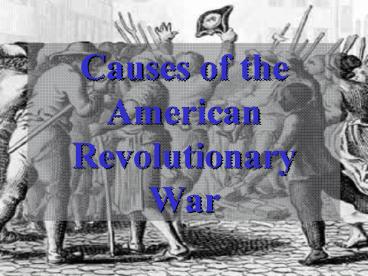Causes of the American Revolutionary War - PowerPoint PPT Presentation
1 / 22
Title:
Causes of the American Revolutionary War
Description:
Boycott (refusal to buy) British goods. Reaction/Result ... Organize a new boycott of imported goods. Spinning bees Daughters of Liberty ... – PowerPoint PPT presentation
Number of Views:96
Avg rating:3.0/5.0
Title: Causes of the American Revolutionary War
1
Causes of the American Revolutionary War
2
French and Indian War
- Dates 1754-1763
- Describe A British victory, which put England in
debt. - They would attempt to make the colonists pay for
their protection. - Reaction/Result Great Britain begins to strictly
enforce Navigation Laws
3
Proclamation of 1763
- Date 1763
- Describe Prohibited colonists from settling
west of the Appalachian Mountains. - Reaction/Result Colonists, outraged, settled
there anyway.
4
Sugar Act
- Date 1764
- Describe Lower the cost of foreign-made molasses
- Cracked down on colonial smuggling.
- Reaction/Result However, colonists find ways to
still smuggle in sugar
5
Quartering Act
- Date 1764
- Describe Required colonists to provide food and
living quarters for British troops - Reaction/React Colonists were upset with British
soldiers in their homes, added tension btw troops
and colonists
6
Stamp Act
- Date 1765
- Describe British passes a tax law requiring
colonists to purchase special stamped paper for
printed items
7
Stamp Act Reaction/Result
- Stamp Act Congress NYC Declaration of Rights
and Grievances - Boycott (refusal to buy) British goods
8
Reaction/Result
- Sons and Daughters of Liberty Sam Adams- mobs
harassed customs agents, tarred and feathered tax
collectors, destroyed revenue stamps. - Stamp Act Repealed Declaratory Act 1766 issued
to colonies parliament had the right to tax and
make laws for the colonies.
9
Second Phase 1767-1773
- Date 1767 Townshend Acts
- Describe
- Direct tax on colonial imports of tea, glass and
paper. - Officials could search homes using writ of
assistance for smuggled goods.
- Reaction
- Colonists protest taxation without
representation - Organize a new boycott of imported goods
- Spinning bees Daughters of Liberty
10
Boston Massacre, March 5,1770
- Date March 5, 1770
- Describe British troops stationed in Boston were
taunted by an angry mob. - Describe The troops fire into the crowd, killing
5 colonists. - Reaction/Result Later is called a massacre and a
dramatic engraving was published depicting
violence
Paul Reveres Engraving of the Boston Massacre.
Often noted as anti-British propaganda
11
- List three things you notice in this image.
- According to the details of the engraving, what
advantages do the redcoats have that the
colonists do not? What point does the artist make
through this contrast? - How could this engraving have contributed to the
growing support for the Patriot cause?
12
The Tea Act, Dec. 16 1773
- Date 1773
- Describe British gives the East India Company
special concessions in the colonial tea business
and shuts out colonial tea merchants - Reaction Boston Tea Party Colonists dumped 342
chests of tea into the harbor
13
Coercive Acts
- Date 1774
- Describe Intolerable Acts
- 1. Port Act closed Boston Harbor
- 2. Reduced power of Mass. Legislature
- 3. Royal officials to be tried in England
- 4. Quartering Act applied to all colonies
14
First Continental Congress
- Date September 1774 - Philadelphia
- Reaction/React Colonial leaders form the First
Continental Congress and drew up a declaration of
colonial rights.
15
Lexington and Concord
- Massachusetts declared to be in a state of
rebellion. British troops increased presence in
colony. - Date April 18, 1775
- Describe General Gage orders troops to march to
Concord, M.A. and seized colonial weapons - British continued onto Concord where they
destroyed military supplies - Reaction/React Minutemen intercept the British
and engage in battlefirst at Lexington, and then
at Concord.
16
Bunker Hill
- June 17, 1775 British and the colonial militia of
Massachusetts fought on Breeds Hill. The
British suffered over a thousand casualties
taking the hill. Colonists claimed a victory.
17
Second Continental Congress
- May 1775 Philadelphia
- George Washington was appointed
commander-in-chief of colonial army - July 1775 Olive Branch Petition sent to King
George III, which pledged their loyalty and asked
for protection of colonial rights. - King George rejected plea and declared colonies
in rebellion
18
Thomas Paines Common Sense
- Date April, 1775
- Pamphlet argued that colonies become independent
and break all ties with England. - It was against common sense for a large continent
to be controlled by a small distant island.
Also, to pledge loyalty to a King whose
government was corrupt and whose laws
unreasonable.
19
The Declaration of Independence
- Thomas Jefferson wrote document, which proclaimed
colonial independence from Great Britain. They
did not declare war! - It also mentioned that individuals have
unalienable rights that are protected by a
government. Government gets power from consent
of governed. (Thomas Hobbes)
20
We hold these truths to be self-evident, that
all men are created equal, that they are endowed
by their Creator with certain unalienable Rights,
that among these are Life, Liberty and the
pursuit of Happiness. That whenever any Form of
Government becomes destructive of these ends, it
is the Right of the People to alter or to abolish
it, and to institute new Government, laying its
foundation on such principles and organizing its
powers in such form, as to them shall seem most
likely to effect their Safety and Happiness.
21
Enlightenment Thinkers
- Thomas Hobbes social contract in which people
give power to the government for an organized
society - John Locke natural rightslife , liberty, and
property - Jean-Jacques Rousseau social contract in which
people follow the general will for true liberty
Thomas Hobbes
John Locke
Jean-Jacques Rousseau
22
Quotes































